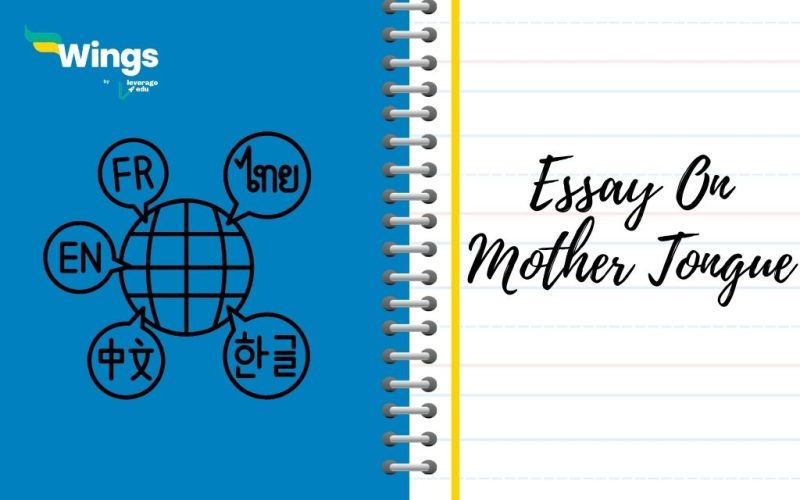Essay on Mother Tongue: To highlight the significance of mother tongue, Brigham Young said “See that your children are properly educated in the rudiments of their mother tongue, and then let them proceed to higher branches of learning.”
Mother tongue refers to the language we learn at our home. Fluency in this language allows one to grow and explore. Also, knowledge of one’s mother tongue helps carry forward our cultural identity. Apart from these, one’s mother tongue also enables one to understand the local culture and establish and grow business in that area.
Table of Contents
Also Read: Benefits of Learning Local Language of a Country
Sample Essay on Mother Tongue in 100 Words
Mother tongue, also known as native language or first language, is spoken at home. It forms the core of our identity, embodies our cultural roots, and helps emote our thoughts. It also serves as a bridge that connects generations.
Our first words, cradle songs, and childhood fairy tales are all transferred to us in our mother tongue. All these memories give a sense of belongingness. One should preserve one’s native language as it is often effective in family communication.
Mother tongue holds importance in everyone’s life as it facilitates cognitive development and learning foreign languages. This further helps us in our academic and professional journey.
Also Read: Top 10 Language Learning Websites of 2024: Discover, Learn, and Connect
Sample Essay on Mother Tongue in 200 Words
Mother tongue is the first language that we learn in childhood. It plays a vital role in shaping our worldview. It is a means of communication and a repository of culture, values, and familial bonds. As a child when we speak our first words our parents try to embrace that moment for eternity.
Also, speaking our native language helps us remain in touch with our traditions, rituals, and familial histories. Thus, it is necessary to preserve our first language and pass it on to future generations.
In this globalised world, our linguistic diversity is at risk as most schools and universities impart education in English or other global languages. Thus, to safeguard one’s native language, one must try conversing in that language with her/his/their family and friends. Moreover, safeguarding the tongue promotes a sense of pride and belonging. Also, it reinforces the uniqueness of each language’s heritage.
Thus, our first language defines our beginning and origin. It is just not a mode of communication; instead, it is like a bundle of precious words that helps one to learn and explore more languages. Learning more than one language helps us become a part of an extended society. It is like a treasure that we have been taking care of since childhood.
Also Read: What are Language Skills?
Also Read: How to Prepare for UPSC in 6 Months?
Sample Essay on Mother Tongue in 300 Words
Mother tongue which is spoken by a person from birth, is significant in shaping one´s identity and cultural connection. It serves as the medium through which one starts to express and understand emotions. Also, it helps shape our fundamental cognitive structures. Thus, one should preserve and embrace one´s mother tongue for learning other languages in the future.
Mother tongue is a vessel of cultural heritage. It helps in the refinement of traditions and customs. This heritage is carried forward and passed down through generations. As a storage of shared experiences, the mother tongue connects individuals to their roots and encourages a sense of belonging.
Secondly, proficiency in one´s mother tongue is important for effective communication. One can express thoughts and feelings most authentically. Mastering one´s mother tongue lays the foundation for acquiring additional language skills, and facilitates cross-cultural understanding. One should remember that language is just not a tool for communication but a gateway to comprehending the complex layers of thought and expression.
Furthermore, mother tongue education also plays a crucial role in academic success. Research indicates that students who receive instruction in their native language, tend to grasp complex concepts more quickly. It gives a deeper understanding of subjects and lays the groundwork for overall development.
In conclusion, the mother tongue is a foundation of cultural identity, effective communication, and academic achievement. Its preservation is not only necessary for linguistic diversity but also for indication of the richness of human experience.
Also Read: Branches of Linguistics
FAQs
Ans. For numerous individuals, their native language holds significant value in shaping their identity. It serves as a source of pride and a link to their cultural heritage. Proficiency in one’s mother tongue not only enhances self-awareness but also fosters a deeper appreciation for the rich cultural heritage.
Ans. Mother tongue refers to the initial language acquired in childhood within the household and remains comprehensible to the individual at the point when the data was gathered.
Ans. We should teach the mother tongue to children to help them connect with culture and explore new languages.
Related Articles:
For more information on such interesting topics, visit our essay writing page and follow Leverage Edu.
 One app for all your study abroad needs
One app for all your study abroad needs













